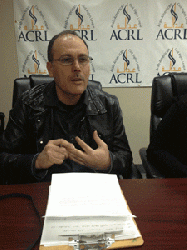DEARBORN — A local civil rights group is taking action in response to the overwhelming number of complaints it has received from Arab Americans who say their bank accounts were closed abruptly with no reasonable explanation.
At a press conference Tuesday, the Arab American Civil Rights League (ACRL) announced that it established a hotline for people facing the same problem, and that it filed a complaint with the U.S. Department of Justice Civil Rights Division Mar. 18 over the mass bank account closures.
Anyone with the same situation, who’s concerned can contact the hotline at 313.633.0890.
ACRL Chairman and Attorney, Nabih Ayad says the group is considering a class action lawsuit because of the high volume of complaints.
Two Arab Americans who had their accounts closed by Flagstar and Huntington Bank spoke at the press conference.
Dearborn Heights resident Jaafar Elrez, who’s the owner of Dearborn’s Jena Sound Stage and Lighting says Flagstar Bank closed his account after it became suspicious about family members sending him $20,000. Elrez explained to bank associates that the family members planned on purchasing a home when they moved to the United States and that the transaction also involved purchasing business equipment. Elrez’s experience differs from several other Arab Americans facing the same problem, because he was provided with an explanation while others haven’t been given a reason.
Elrez’s children, ages seven and eight also had their bank accounts closed. Nazih Jawad of Dearborn, a businessman and pharmacist was a customer at Huntington Bank for 15 years before it closed his accounts last month, and informed him through a letter.
The letter dated Feb. 4 informs Jawad that his bank account would be closed on Feb. 11, and provides no explanation. The bank states that it has the authority to close the account at any given time.
He was also told that from the date of the letter until Feb. 11 he could not make any deposits to his account, and should immediately begin to make other arrangements for any automated credits to or debits from his account, and that any check cards or ATM cards linked to his account would be revoked the closing date.

|
| Jawad |
He was also informed that if he had any questions or concerns to call the number provided, but the decision was reviewed by its management and is final.
“It’s been very uncomfortable,” Jawad said. “In America you are innocent until proven guilty.” He says he was part of the bank’s family, and has been a customer there longer than many people have worked at the branch.
Jawad and others say the bank account closures are very inconvenient, because of debits and credits coming in and out of the accounts, and primarily because they have limited time to open new accounts at different banking institutions, sometimes only days.
Ayad and ACRL Executive Director Rana Abbas say it’s not local branch managers or employees who’re closing the accounts, but rather it’s being done at the higher corporateoffice level. Ayad says many local branch managers have expressed dismay at the actions of the their bank’s higher office, but have no authority over the decision.
“It’s important to understand action is being taken without any due process,” Abbas said.
Ayad says in the last two months alone, his firm Ayad and Associates and the ACRL have received 12 complaints from Arab Americans regarding the same issue, and that excludes the number of attorneys who have contacted him about clients who’re dealing with the same situation.
Most of the complaints are from successful professionals and business owners who have banked with the same institution for years. Other than a letter, informing them of the bank’s decision to close their accounts, people haven’t been provided with another notice or explanation.
Several Arab Americans were also placed on the ‘U.S. No Fly List without explanation. After bringing a federal lawsuit against the FBI, U.S. Department of Justice and the Terrorist Screening Center in the U.S. District Court for the Eastern District of Michigan the ACRL managed to get Jamal Rizk, a local paralyzed Arab American off the list. Rizk was never provided with an explanation.
The Arab American community has seen an increase in similar bank account closures over the past decade, since the attacks on 9/11.
“We continue to be victimized 11 years later,” Ayad said.
The ACRL believes that based on the number of complaints that have come through its office in recent months there’s an apparent concerted effort being made to close the accounts of individuals who fit a certain profile. The group says all the individuals who have been targeted and come forward happen to be Arab American.
The ACRL says it is unacceptable for any U.S. citizen, or resident not to have the right to bank where they choose, or be forced out of a “reputable” financial institution for no given reason and without any provocation.
The banking institutions also include Comerica and Charter One among others.
“These are successful people they’re not criminals. It’s dehumanizing,” Ayad said. For more information on the ACRL visit www.acrlmichigan.org.






Leave a Reply